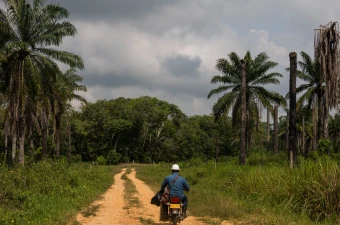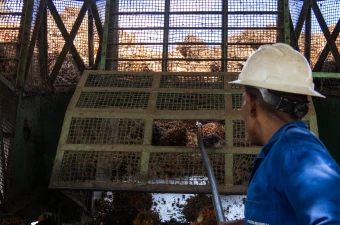Major human rights issues at Indonesian palm oil companies
“Even at certified palm oil companies, human rights, including trade union rights, are regularly violated and employees are faced with poor working conditions. There are even cases of child labour”, according to Arend van Wijngaarden, CNV vice-chair. This appears from a study by CNV Internationaal into the employment conditions at palm oil plantations in Indonesia.
A new study, carried out by the Stichting Onderzoek Multinationale Ondernemingen (SOMO) research agency, has been published during the Fifth Annual European Roundtable, organised by the Round Table on Sustainable Palm Oil (RSPO) in London.
Van Wijngaarden: “With this report, we hope to achieve tighter compliance with social standards.” Increasing numbers of companies are using certified palm oil. Van Wijngaarden: “As such, that is good news, yet according to this research by CNV Internationaal, ‘certified’ is a relative concept. It is still seriously lacking.”
CNV Internationaal sent the research report to European commissioner Cecilia Malmström, responsible for negotiating the trade agreement between the European Union and Indonesia (CEPA). CNV Internationaal calls on the European Committee to demand attention for human and trade union rights for workers in Indonesia during the negotiations.
Child Labour
The study shows that there is a lot of unpaid overtime and that the production targets are set too high. Van Wijngaarden: “This increases the pressure on workers to such a degree that they are forced to take family members to work to meet the production targets. This places women and children into unsafe situations at work. Furthermore, it appears that not all workers have an employment contract, that workers don’t wear suitable safety clothing and that the medical provisions are unsatisfactory. This means the international workers’ rights, established in international ILO standards, are being violated.”
Indonesia is the largest palm oil producer in the world. Palm oil is used increasingly in the products we buy. The Netherlands is in the top five of palm oil buyers from Indonesia; companies such as Akzo Nobel, Unilever and Koninklijke Ahold use this palm oil in their products. About half of all products on the shelves – and even 60 percent of food products, such as chocolate, ice cream and ready meals – contain palm oil.
Dialogue
Van Wijngaarden: “This report is not intended to name and shame companies. But we hope to use these facts and figures when entering into dialogue with the palm oil suppliers to improve employment rights and conditions. And it’s working: we are already in discussions with one of the companies (Sime Darby). But it would be even better if we could start negotiating with the Indonesian trade organisations at a local level in Indonesia.
That is what we would ultimately like to achieve; that dialogue can be held at a local level between the trade unions and plantation owners to improve the employment rights and conditions on site.”
Publication date 15 06 2017


